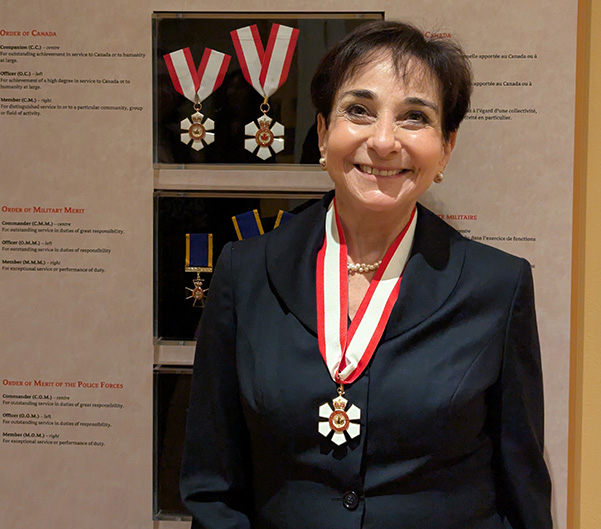Dr. Eva Grunfeld: Blazing a trail in primary care oncology

Dr. Eva Grunfeld’s research has changed the way we think about and deliver cancer care in Canada and around the world.
Through years of groundbreaking work, Dr. Grunfeld has led the way in bringing family doctors and cancer specialists together to give patients more connected support before, during, and after treatment—with a focus on the after.
“Like most clinicians, my research journey was motivated by seeing something I felt could be improved,” she says. “When I started my clinical practice, I was very focused on cancer care, and I did see gaps for patients that raised research questions in my mind.”
Those questions led Dr. Grunfeld down a research path demonstrating that better integration of primary care and oncology care improves access to and quality of care for patients. For this, and for her research on cancer survivorship. Dr. Grunfeld was appointed as an Officer of the Order of Canada in 2022.
Dr. Grunfeld is a clinician-scientist and a professor at the University of Toronto’s Department of Family and Community Medicine. She has held many leadership roles at different organizations over the years and says that passion and curiosity have guided her medical and research career.
That career includes numerous studies and clinical trials. “I was probably one of the first people to be asking questions about the relationship between the oncology and primary care systems,” she says. “They were functioning in silos, but we now have primary care oncology – a growing discipline around the world.”
Dr. Grunfeld led the CIHR-funded CanIMPACT program (Canadian Team to Improve Community-Based Cancer Care along the Continuum). The program brought together health care providers, researchers, policy makers and patients from across Canada to research different topics to help bridge gaps in communication, continuity and coordination of cancer care.
The research made it clear that primary care needs to be involved in cancer care in many phases of a person’s cancer journey. Family doctors know their patients’ full history and are often the first step in spotting cancer early. What the research also found was that primary care plays a significant role in survivorship. The research helped shift the thinking around the post-treatment period.
Previously, once a person finished treatment or was in remission, the focus was mostly on keeping an eye on the cancer or the effects of treatment.
“Survivorship is a unique and important phase with its own requirements,” Dr. Grunfeld says. “Fortunately, many people will be long-term survivors. We now understand that there are other elements of wellness that need attention post-treatment but weren’t attended to because the entire focus was on the cancer.”
Dr. Grunfeld notes that primary care plays a key role in further prevention, screening, surveillance and managing other chronic conditions that are important for a cancer survivor’s continued health and quality of life.
To further help integrate care, Dr. Grunfeld also co-founded The BETTER Program, an evidence-based program that trains health care practitioners such as nurses or dietitians to be experts in chronic disease prevention and screening. Rather than focusing on one condition at a time, the program looks at lifestyle risk factors shared by multiple diseases and creates a personalized prevention prescription to prevent chronic diseases, including cancer.
Dr. Grunfeld says there will always be room for the system to improve, but she is proud that survivorship is now recognized as a unique phase of cancer with its own specific requirements. She remains committed to turning research evidence into practice to benefit patients. “Health care is important for the well-being of the population, and I want to continue to contribute.”
At a glance
Issue
Primary care and cancer care were operating in silos for many years, which was affecting patients’ access to and quality of care.
Research
Dr. Eva Grunfeld’s research played a critical role in bringing family medicine and cancer care together, helping to create the field of primary care oncology. Her work also showed that cancer survivorship is a unique phase with specific care requirements.
- Date modified: